|
Puccini La Fanciulla del West & Bellini Norma
Opera Holland Park at The Holland Park Theatre, London, 15 & 21 June 2004
La Fanciulla del West on DVD 1991
Minnie - Elizabeth Blancke-Biggs; Dick Johnson - Ravil Atlas; Jack Rance - Oli Sigurdarson
City of London Sinfonia and the Opera Holland Park Chorus, Conductor John Gibbons;
Director Jo Davies;
Design Will Bowen;
Lighting Mark Doubleday
Norma - Nelly Miricioiu; Pollione - Don Bernardini; Adalgisa - Diana Montague
City of London Sinfonia and the Opera Holland Park Chorus, Conductor Brad Cohen
Minnie - Mara Zampieri; Dick Johnson - Placido Domingo; Jack Rance - Juan Pons;
La Scala/Lorin Maazel
OpusArte La Scala Collection OAL3004D
I have always enjoyed La Fanciulla del West immoderately; Puccini thought it one of his best,“a second Bohème, only stronger, bolder and more spacious”, and who am I to argue? This week, the bonus of a splendid DVD from La Scala had me apprehensive for seeing its revival in urban London's country house opera few days afterwards. No worries there; the finest production from this variable organisation since Holland Park Opera's landmark Fidelio in 2002.
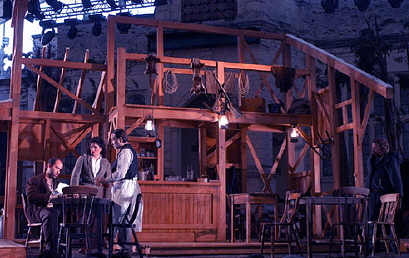 Premiered at The Met under Toscanini (1910), its tenuous hold on the repertoire - not forgotten but not often revived - has several possible reasons, none of them good. Tom Sutcliffe, who writing in in the Opera Holland Park programme book thinks it "an adorable work because of its unusual local colour - and because its spread of character types is broad and convincing", and reminds us that "Even today nobody else has attempted to bring alive the world of pioneering America in operatic terms". Premiered at The Met under Toscanini (1910), its tenuous hold on the repertoire - not forgotten but not often revived - has several possible reasons, none of them good. Tom Sutcliffe, who writing in in the Opera Holland Park programme book thinks it "an adorable work because of its unusual local colour - and because its spread of character types is broad and convincing", and reminds us that "Even today nobody else has attempted to bring alive the world of pioneering America in operatic terms".
Opera audiences like a tragedy which ends with the deaths of villains and fragile heroines, but Minnie, the heroine of Fanciulla is " bursting with health - a woman on her own who does not need a man to justify her presence and who can lay down a clear and credible view of how people ought to behave. It is a happy opera embodying the possibility of forgiveness and warning against quick moral conclusions. One woman against the world - who chooses to take up the 'case' of an outcast".
There is a lot of gun toting in La Fanciulla but it is mostly just display, to assert power in a lawless society of migrant workers in California; many links with today's miseries far from home, if we want to make the connections. The atmosphere is of thwarted ambitions and lives going to waste.
Jo Davies has the motley collection of tired and mostly disgruntled gold prospectors act as vulnerable individuals, in perfectly choreographed cameos which had you looking to left and right across the wide stage to catch all that was going on. The scene was set perfectly for the arrival of the soon-to-be reformed outlaw and the drama of two men and a girl was under way. There are dramatic symmetries. A card sharper is caught and disgraced, but not hanged, in the first act; in the next Minnie cheats at cards to claim her man.
At Holland Park Rance, Oli Sigurdarson, is seedy and unkempt, bound to be a loser, perhaps the saddest character of them all when he finds his authority as sheriff evaporates and he is thrown back upon his own meagre personal resources. Johnson, Ravill Atlas a fine heroic tenor recovered from a throat infection since the first night, was entirely persuasive as the man to sweep the sexually inhibited Minnie off her feet in complete love at second sight capitulation (they knew each other a little once). Minnie, with whom Rance is besotted, is the centre of the community and everyone defers to her, even to the extent of taking Bible lessons; not an impossibility in those far off days in California. A lovely part which requires no pretence that the star dramatic soprano is really an immature, frail and ailing young woman; the American Elizabeth Blancke-Biggs siezes the role and makes it hew own. Sigardson gets the sudden surges of rage and impotent despair to perfection; he tries to deflect it in the lynching scene, narrowly averted by the resourceful Minnie, who takes charge and defuses the situation before taking her man away to the peacocks of Holland Park and a new life. One comes close to hoping against hope that it will succeed..... They might change and adjust, but Rance is left behind to brood upon his failures.
The large orchestra was in fine fettle and John Gibbons a sensitive conductor with a real feel for Puccinian rubato; if the brass nearby took over the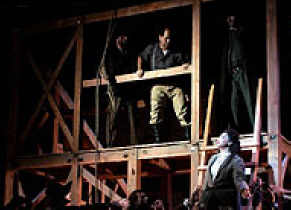 climaxes for those of us on the right, the compensation was a large, bright new box for the surtitles, which were perfectly judged to give just the right information promptly. climaxes for those of us on the right, the compensation was a large, bright new box for the surtitles, which were perfectly judged to give just the right information promptly.
The set is clever, pine trees either side leading out to Holland Park's real ones. The structure turns easily from bar to Minnie's hut, but I was less sure about the ready-made scaffold kit, put together as a by scurrying miners in the pause before the last act. And it was disconcerting that Johnson knew where to climb and seat himself ready to be pushed off into oblivion! A rougher and unready tree, with a branch to sling a rope over, would have been more plausible - but who cares, in Holland Park's splendid tent, with the orchestra on a level with us between audience and action. A great, inspiriting night at the opera.
It has been said that this opera is handicapped by the lack of huge sweeping tunes which live in the memory; I see that as an advantage. The orchestral commentary is constantly fascinating, changing with the moods of the economical and pointed libretto, each episode filling in the restricted world shared by this ill-assorted group living together, every phrase finding its musical echo from Puccini. I found myself thinking of Janacek's orchestral support for his dramas, not that their sounds have anythin g in common. g in common.
Less to say about OPH's Norma on 21 June, with
Nelly Miricioiu past her sell-by date (though seemingly in better voice than on the first night) and null staging with little more to see than the same pine trees we saw in Fanciulla's California. The hyped heroine started tentatively in Casta Diva but warmed up enough to give an affecting duet with Diana Montague in the second act, helped by a red gown and a peculiar red wind breaker in front of which they emoted affectingly.
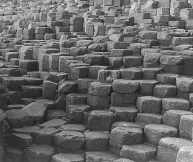 But Miricioiu lost the plot again in the last act, which was counterpointed by an off-putting deluge of rain dripping noisily off the roof of the OHP tent. But Miricioiu lost the plot again in the last act, which was counterpointed by an off-putting deluge of rain dripping noisily off the roof of the OHP tent.
She seemed tired and relapsed to strained delivery and variable intonation as noted on the first night, before she ascended a structure inspired by the Giants' Causeway for ritual incineration with her American anti-hero.
Brad Cohen conducted his newly researched edition with aplomb, but this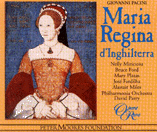 was not the production to assess its musicological merits. was not the production to assess its musicological merits.
For Nelly Miricioiu at her formidable best c.1995, hear her in Maria Regina d'Inghilterra (1843) by Giovanni Pacini (1792-1867) on Opera Rara ORC 15. [This opera is not to be confused with
Rossini's Elisabetta Regina d'Inghilterra reviewed on DVD.]
If by any chance you don't have any of this company's rare opera releases, you have a pleasure awaiting you. They are recorded with the best bel canto voices available and the booklets are a joy to handle and study. This one runs to 195 pages, with full texts and English translations, a 78 page essay by Jeremy Commons on the opera and its nearly forgotten composer, the whole laced by lavish evocative illustrations, historical and of the cast.
La Fanciulla del West on DVD
Opus Arte OAL3004D
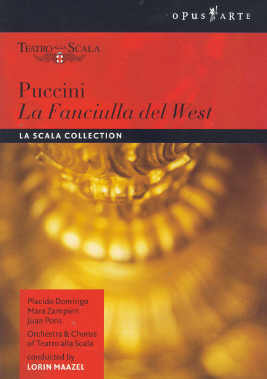 The newly released DVD is the best of a batch from OpusArte in their La Scala Collection of video transfers. Conducted tautly by Lorin Maazel in 1991, it is cast from strength. The newly released DVD is the best of a batch from OpusArte in their La Scala Collection of video transfers. Conducted tautly by Lorin Maazel in 1991, it is cast from strength.
Placido Domingo is the outlaw hero of the opera, Juan Pons better dressed than his London counterpart, but still Minnie will have none of him.
Mara Zampieri is rivetting from first appearance until her departure from California to who knows where, totally different from her extraordinary assumption of the chilling Lady Macbeth in the admired
Sinopoli/Ronconi DVD on Arthaus Musik. A dramatic soprano who gets right inside her roles. She has a still authority and presence here with a voice which stamps her as a great artist; all are in good voice and we found ourselves playing it straight through, not our invariable practice at home - another fine night at the opera. Very strongly recommended.
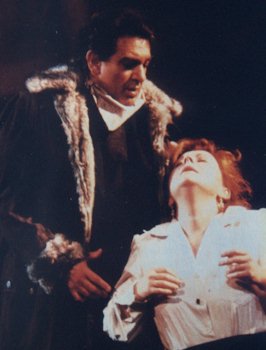
Domingo & Zampieri in the 1991 Scala Macbeth
Illustrations of the Holland Park set in Acts 1 & 3 are from extensive archives of photos of Opera Holland Park productions, at http://www.operahollandpark.com/
|



